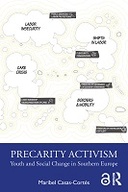Explore

Activist networks throughout Europe developed the concept of precarity at the turn of the 21st century. Retail chain employees, freelancers, cultural workers, caregivers and university adjuncts alike, including those labeled natives or migrants, identified and organized themselves under the umbrella notion of precarity. This ethnography tells the story of precarity activism as it originated and evolved in Southern Europe, tracing its theoretical and linguistic legacy. Highlighting the currency of precarity-inspired proposals for social change, this empirically detailed appraisal recapitulates activist debates over the prospects of flexible labor markets entangled with questions of gender and citizenship. The book’s analysis offers insight into how precarity activism’s visionary notions of sustainable futures speak directly to the tensions of the platform economy.
This genealogy of a grassroots political concept will be of use for postgraduate students and scholars interested in anthropology, cultural studies, geography, sociology and political theory. It will appeal to interdisciplinary fields engaging processes of collective action, knowledge production and the so-called subaltern populations, such as social movements studies, gender studies, critical race and migration studies, dis/ability studies and labor studies. This book will further attract those concerned with changes in production, reproduction and mobility under platform capitalism as it further consolidates precarity as the new normal.
The Open Access version of this book, available at http://www.taylorfrancis.com, has been made available under a Creative Commons Attribution-Non Commercial-No Derivatives (CC-BY-NC-ND) 4.0 license.
This book is included in DOAB.
Why read this book? Have your say.
You must be logged in to comment.
